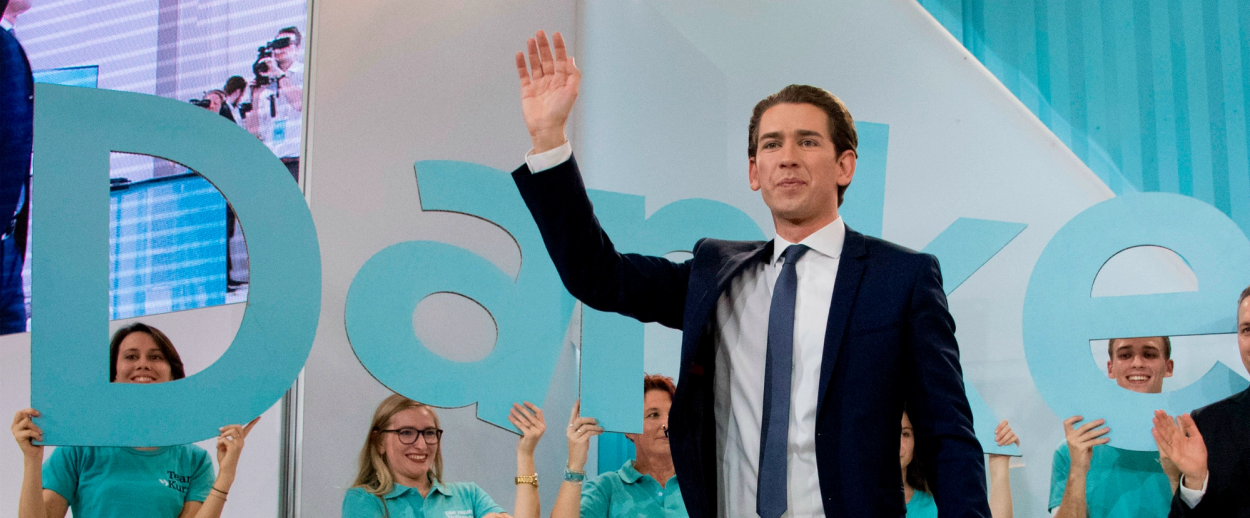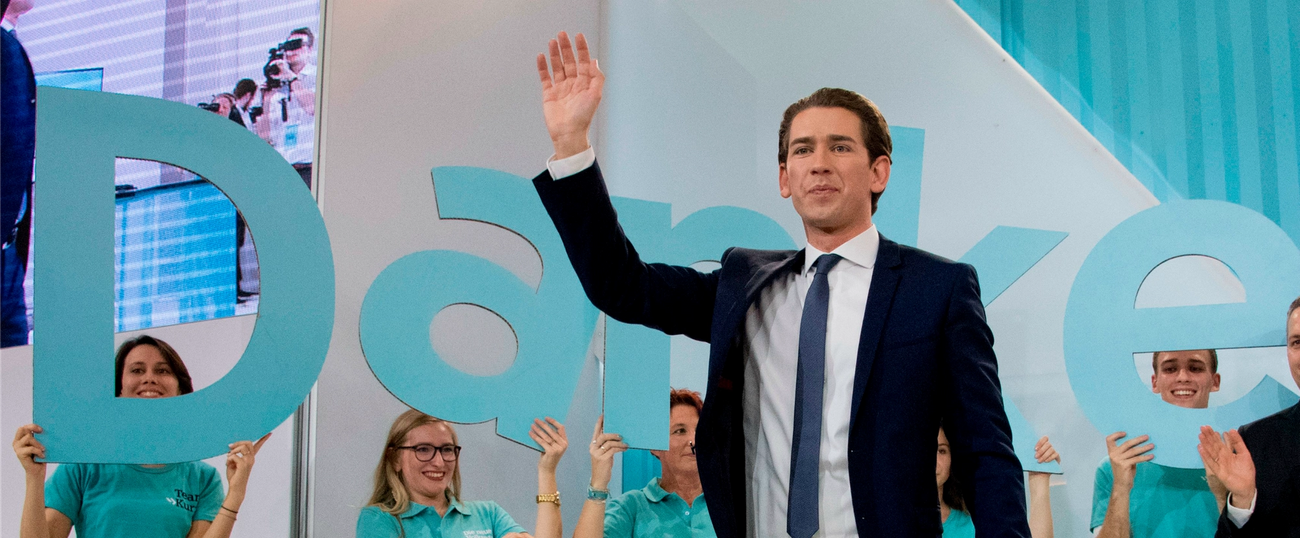Far-Right Strengthened in Austria After Sunday’s Election
Making sense of Sebastian Kurz, Austria’s new Chancellor




Austrian voters handed the chancellery to 31-year-old right-wing foreign minister Sebastian Kurz and his People’s Party (ÖVP) on Sunday, in the process giving the far-right Freedom Party (FPÖ) its best result since 1999. At 19:49 CET Sunday, public broadcaster ORF projected the ÖVP had won 31.7 percent of the vote, with the Social Democrats (SPÖ) on 26.9 percent and the FPÖ on 26 percent. Kurz will likely form a coalition with the far-right; Kurier reported Saturday that he wants a deal done by Austria’s National Day on October 26. A coalition with the SPÖ is also possible.
The result confirmed a shift to the right in Austrian politics that hitherto had been perceptible if not quantified. The refugee crisis of 2015, which saw Austria receive more asylum applications relative to population size than Germany, coarsened attitudes towards outsiders in general. Kurz staked his claim to high office on his closure of the so-called Balkan route for migrants seeking entry into the European Union from Turkey. He also supported a ban on face coverings that came into effect on October 1. FPÖ leader Heinz-Christian Strache, however, claimed Kurz was weak on what he called the “Islamization” of Austria.
Austria’s left-liberal parties were the victims of the decline of social democracy in Europe. The SPÖ’s result was not as bad as it could have been. Still, they were hobbled by a series of missteps and unforced errors during the campaign. Their class-oriented slogan, “Get what’s yours,” was ridiculed in the press as “a call to arms for petty thieves” before being abandoned. They refused to rule out a coalition with the far-right, which as the novelist and political campaigner Doron Rabinovici told me, at once deprived people of a reason to vote for them while legitimizing the FPÖ as a partner in any government—including one lead by the ÖVP.
But nothing helped the right—and the FPÖ in particular—more than the Silberstein affair, which dominated the election’s final weeks. Israeli political consultant Tal Silberstein was fired as a campaign advisor by the SPÖ in August, when he was arrested on suspicion of money laundering and other charges. It later emerged Silberstein had been running fake Facebook sites against Kurz, which utilized racist and anti-Semitic tropes, including that Kurz was funded by American philanthropist George Soros. SPÖ campaign manager Georg Niedermühlbichler then resigned and party leader Christian Kern launched an inquiry into the pages, denying knowledge of their existence.
“Silberstein” quickly became a by-word for dirty campaigning, with his name deployed in ways that, at the very least, sounded anti-Semitic. Kurz, a popular candidate within Austria’s Jewish community, said the election would be about “whether we want the Silbersteins and others” in Austria. Left-populist challenger Peter Pilz said he wanted Austria to be “Silberstein-free.”
For the FPÖ, the Silberstein affair was a gift. Never mind that the party had its own problems with anti-Semitism during the campaign. An FPÖ mayor was alleged to have used the Hitler salute and shouted “Heil Hitler,” potentially breaking laws against “reactivation” of Nazism. Other FPÖ functionaries were found to have collected Nazi memorabilia and wished Hitler a happy birthday on Facebook. As for Strache, a lengthy report published in the Süddeutsche Zeitung just this month chronicled his alleged background in neo-Nazi and far-right paramilitary movements as a young man.
Yet somehow Strache was able to cast himself as an old hand, above the pettiness of the Silberstein affair, precisely because it played to the FPÖ’s central narrative of a corrupted two-party system that only the far-right can smash. “The red-black coalition is the biggest problem,” was one of the FPÖ’s slogans, referring to the party colors of the SPÖ and ÖVP respectively. Left and right have governed Austria together since 2006 and have seen their collective support decline from almost 70 percent of the vote to below 60 percent in the meantime. Altogether, one or either of the SPÖ and ÖVP has governed Austria since the end of the Second World War, begetting clientelism and a lack of transparency.
The refugee crisis put the wind in the FPÖ’s sails, it is true, but Austria’s swing to the right cannot be explained by that alone. Nor do Brexit or Donald Trump have much to do with it either. Between Kurz mimicking the FPÖ’s rhetoric on immigration and integration, the SPÖ flirting with the idea of coalition, and the aforementioned Silberstein affair, the two main parties have done more to normalize the far-right in Austria than Strache could ever have hoped to achieve by himself. It has been a long time coming, in other words, and the Austrian political class, in part, has itself to blame.
Liam Hoare is a freelance writer based in Vienna, where he is the Europe Editor for Moment and a frequent contributor to Tablet.